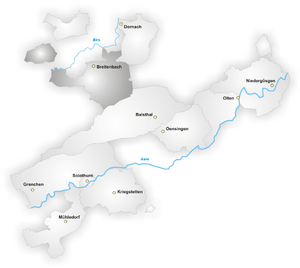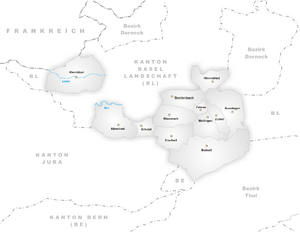Thierstein District facts for kids
Thierstein District is one of the ten districts in the canton of Solothurn in Switzerland. It's located in the northern part of the canton. Thierstein District and the Dorneck District together form an Amtei, which is like a special voting area called Dorneck-Thierstein. As of 31 December 2020, about 14,802 people live here.
Contents
Towns and Villages in Thierstein
Thierstein District has twelve different towns and villages, which are called municipalities. One of these, Kleinlützel, is a bit special because it's an exclave. This means it's a piece of land that belongs to Thierstein but is completely surrounded by other areas, not directly connected to the rest of the district.
| Coat of arms | Municipality | Population (31 December 2020) |
Area, km² |
|---|---|---|---|
| Bärschwil | 803 | 11.20 | |
| Beinwil | 274 | 22.67 | |
| Breitenbach | 3,979 | 6.83 | |
| Büsserach | 2,296 | 7.55 | |
| Erschwil | 948 | 7.48 | |
| Fehren | 595 | 1.50 | |
| Grindel | 502 | 3.05 | |
| Himmelried | 961 | 6.00 | |
| Kleinlützel | 1,218 | 16.34 | |
| Meltingen | 655 | 5.76 | |
| Nunningen | 1,914 | 10.27 | |
| Zullwil | 657 | 3.63 | |
| Total | 14,802 | 102.28 |
Geography and Land Use
Thierstein District covers an area of about 102 square kilometers (or 39 square miles). A large part of this land is used for farming, about 40.5%. Even more of the land, about 52.2%, is covered by forests.
The rest of the land is used for buildings and roads (6.9%), or it's made up of rivers and lakes (0.1%). A very small part (0.2%) is unproductive land, meaning it can't be used for farming or building. Most of the water in the district is from flowing rivers.
Coat of Arms
The official symbol, or blazon, of Thierstein District's coat of arms shows a red doe (a female deer). It is standing on three green hills. The background color of the shield is gold.
People and Languages
As of December 2020, the population of Thierstein is 14,802 people. Most people in the district speak German. In 2000, about 91.8% of the population spoke German.
The next most common languages were Italian (1.6%) and Albanian (1.3%). A smaller number of people also spoke French or Romansh.
In 2008, the population was almost evenly split between males (50.3%) and females (49.7%). Most residents were Swiss citizens. About 41.7% of the people living in Thierstein in 2000 were born right there in the district. Many others were born elsewhere in Switzerland or outside the country.
Population Changes Over Time
The population of Thierstein District has changed over the years. This chart shows how the number of people living in the district has grown or shrunk at different times in history.

Politics and Elections
In the 2007 federal election, people in Thierstein voted for different political parties. The most popular party was the FDP, which got about 30.48% of the votes.
The next most popular parties were the SVP (26.61%), the CVP (23%), and the SP (10.94%). About 48.9% of eligible voters participated in this election.
Religion in Thierstein
According to the 2000 census, most people in Thierstein District are Roman Catholic, making up about 70.4% of the population. Another 12.0% belong to the Swiss Reformed Church.
There are also smaller groups of people who are Orthodox Christians, members of the Christian Catholic Church, or other Christian churches. Some residents are Islamic (2.04%) or Jewish (0.04%). A small number of people follow Buddhism or Hinduism. About 10.44% of the population said they had no religion or were agnostic or atheist.
Education System
In Thierstein, a good number of people have completed higher levels of education. About 37.1% of the population has finished non-mandatory upper secondary education. Also, 8.5% have gone on to complete even higher education, like attending a university or a specialized college (a Fachhochschule).
During the 2010–2011 school year, there were 303 students in the Thierstein district's school system. In the Canton of Solothurn, children can attend two years of non-required Kindergarten. After that, students must attend six years of primary school. The secondary school program includes three required years, followed by three to five years of optional advanced schooling. In Thierstein, 282 students were in lower secondary school during that time.
See also
 In Spanish: Distrito de Thierstein para niños
In Spanish: Distrito de Thierstein para niños
 | Isaac Myers |
 | D. Hamilton Jackson |
 | A. Philip Randolph |



